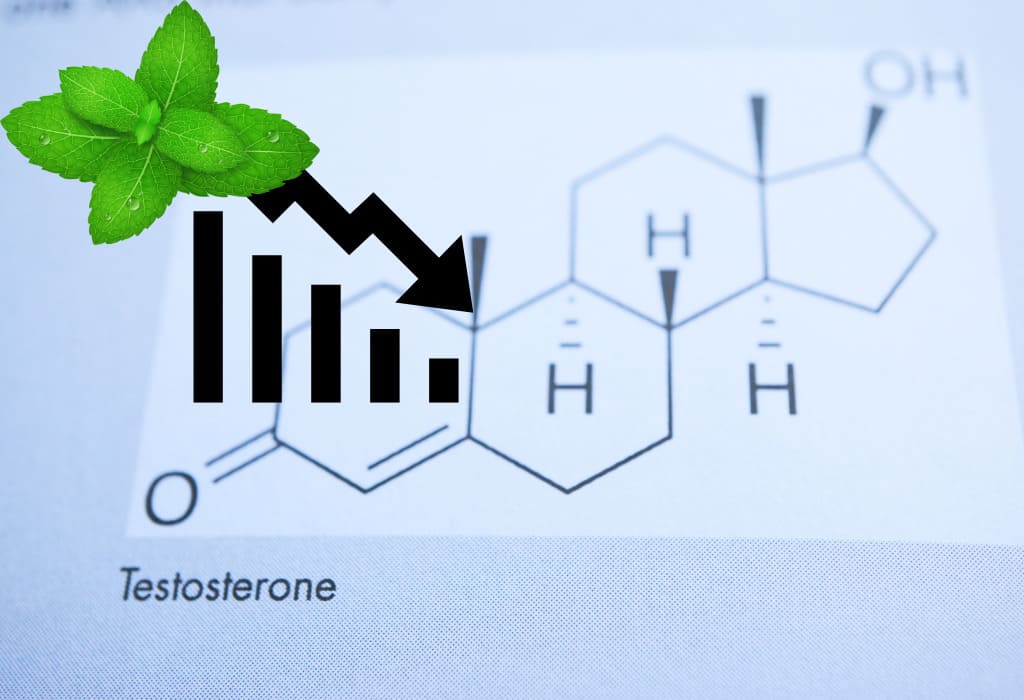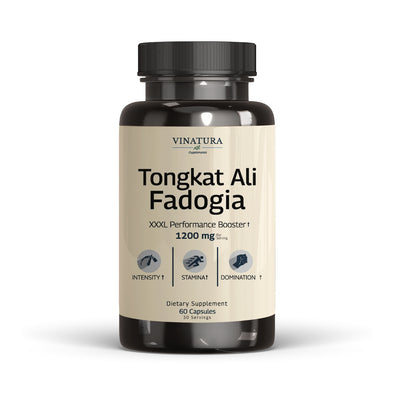
Does Spearmint Lower Testosterone?
Spearmint is renowned for its numerous health benefits, notably its ability to help balance hormones in the body. Of particular significance is its influence on testosterone, a hormone of great importance.
This article offers a detailed look into how Spearmint may lower testosterone levels and the related mechanisms for readers to explore.
Before exploring further, please read the disclaimer located at the end of this webpage.
Does Spearmint Lower Testosterone?
Numerous research studies, ranging from animal models to human trials, consistently indicate a reduction in testosterone levels with the consumption of Spearmint.
For instance, a notable study involved mature male mice who were given spearmint tea at concentrations of 20-40g/l for 15 to 35 days, significantly decreasing their serum testosterone levels [1].
In another study, 21 female patients with hirsutism, including 12 with polycystic ovary syndrome (PCOS), were examined.
These participants consumed 250ml herbal tea made from 5g of dried Spearmint twice daily for 5 days during their menstrual cycle's follicular phase.
The trial demonstrated a significant decrease in free testosterone levels, though the overall testosterone levels remained unchanged [2].
These studies shed light on Spearmint's potential to impact hormone levels, particularly in lowering testosterone levels across various biological contexts.
How Does Spearmint Impact Androgen Levels?
With Females

For a long time, Spearmint has been demonstrated to possess anti-androgenic properties, which are particularly beneficial for female patients suffering from hirsutism due to polycystic ovary syndrome (PCOS).
PCOS is recognized as an endocrine disorder characterized by abnormally increased levels of androgens and oxidative stress.
This condition often results in several external manifestations, including obesity, irregular menstrual cycles, insulin resistance, oligomenorrhea, or anovulation.
Studies have highlighted Spearmint's ability to mitigate these symptoms by reducing androgen production and testosterone levels in the body.
Moreover, the Spearmint benefits for PCOS include its ability to boost antioxidant activity, which plays a vital role in reducing oxidative stress linked to the condition.
Notably, research findings suggest that spearmint consumption can restore ovarian growth and stimulate ovulation, offering a natural remedy to aid patients with PCOS in managing their symptoms and enhancing their reproductive health [4].
You may aslo like: Can We Use Spearmint For Facial Hair Removal?
With Males

In the context of males, the potential benefits and implications of Spearmint's influence on testosterone and overall androgen levels remain ambiguous due to a lack of direct human studies.
However, insights can be gleaned from related research utilizing male animal models.
In correlated research involving a male mouse model, notable decreases in testosterone levels were noted due to the release of Follicle Stimulating Hormone (FSH) and Luteinizing Hormone (LH) from the lower pituitary region of the pituitary gland:
LH is critical in stimulating Leydig cells found in the testes' interstitial tissue to produce and secrete testosterone [3].
Meanwhile, FSH enhances the functionality of Sertoli cells, which act as intermediaries in the action of testosterone [3].
These findings suggest a complex interaction between Spearmint, pituitary hormone release, and testosterone synthesis and secretion in males.
Although these results provide a foundation for understanding Spearmint's potential impact on male hormonal levels, further research in human subjects is necessary to fully comprehend the implications of spearmint consumption on male endocrine health.
How Much Spearmint to Lower Testosterone?
Determining the precise amount of spearmint tea required to impact testosterone levels remains a subject of ongoing research due to the absence of standardized dosage guidelines.
Nevertheless, insights from current studies offer a tentative framework for individuals interested in using Spearmint to maintain hormonal balance.
For women, especially those with conditions related to high testosterone levels like hirsutism, a daily intake of spearmint tea prepared with 40g/l has been suggested as beneficial [2].
In men, based on animal studies, concentrations of spearmint tea ranging from 20g/l to 40g/l have shown a significant decrease in testosterone levels [1].
While these findings are promising, it's important to note that individual responses may vary. It is advisable to approach such regimens cautiously and seek medical guidance before making changes.
You also read: Benefits Of Spearmint For Hair & Scalp: Does Spearmint Block DHT?
How Long Does It Take for Spearmint to Lower Testosterone?
The duration of noticeable effects varies between genders regarding Spearmint's impact on testosterone levels.
For women dealing with symptoms related to high testosterone, like hirsutism, a decrease in free testosterone was seen within five days of drinking spearmint tea twice daily (at a concentration of 40 g/l) [2].
This quick change highlights Spearmint's potential as a natural solution for female hormone balance.
On the other hand, the influence of Spearmint on male testosterone levels tends to unfold more gradually. A study on male mice revealed a reduction in testosterone starting around day 25, with the test lasting 15-35 days of consistent spearmint intake [1].
These findings indicate a slower adjustment in male testosterone levels compared to females.
Frequently Asked Questions
Does Spearmint Tea Increase Estrogen?
Although there is a belief that spearmint tea can raise estrogen levels, there is no scientific evidence to substantiate this assertion.
Does Spearmint Tea Help With High Testosterone?
Based on the information provided, spearmint tea may help balance testosterone levels by reducing elevated concentrations of testosterone level.
Is Spearmint Tea Bad for Testosterone?
The testosterone-lowering properties of spearmint tea could be advantageous for managing high testosterone levels.
Should Men Drink Spearmint?
Men might consider spearmint tea for its health benefits, but it's crucial to stick to the recommended dosage and take breaks. A controlled intake following medical advice ensures that any potential impacts on male reproductive health are minimized.
Conclusion
Spearmint has demonstrated its efficacy in scientifically reducing testosterone levels, offering significant benefits, particularly for women managing PCOS-related hirsutism. However, men should exercise caution when using it, considering potential impacts on reproductive health.
To harness the advantages of Spearmint while mitigating adverse effects, maintaining a consistent dosage and incorporating appropriate breaks are vital strategies.
This comprehensive approach ensures the optimization of Spearmint's positive impact on hormonal health for both genders.
Related Article:
Benefits Of Spearmint Leaf: Medical Properties & Side Effects
Is Spearmint Good for Your Stomach And Digestion?
References
- [1] Kumar, V., Kural, M. R., Pereira, B. M. J., & Roy, P. (2008). Spearmint induced hypothalamic oxidative stress and testicular anti-androgenicity in male rats – altered levels of gene expression, enzymes and hormones. Food and Chemical Toxicology, 46(12), 3563–3570. https://doi.org/10.1016/j.fct.2008.08.027
- [2] Mehmet, A., An, Numan Tamer, M., Cüre, E., Cüre, M., Kale, B., Lu, K., & Delibat, N. (2007). Effect of Spearmint (Mentha spicata Labiatae) Teas on Androgen Levels in Women with Hirsutism. Phytother. Res, 21, 444–447.
- [3] Nozhat, F., Alaee, S., Behzadi, K., & Chegini, N. (2014). Evaluation of possible toxic effects of spearmint (Mentha spicata) on the reproductive system, fertility and number of offspring in adult male rats. AJP, 4(6), 420–429.
- [4] Sadeghi Ataabadi, M., Alaee, S., Bagheri, M. J., & Bahmanpoor, S. (2017). Role of Essential Oil of Mentha Spicata (Spearmint) in Addressing Reverse Hormonal and Folliculogenesis Disturbances in a Polycystic Ovarian Syndrome in a Rat Model. Advanced Pharmaceutical Bulletin, 7(4), 651–654. https://doi.org/10.15171/apb.2017.078
Author

Product Disclaimer
The dietary supplement products mentioned on this website are formulated based on scientific research and adhere to FDA guidelines for dietary supplements. However, the content of the articles has not been evaluated by the Food and Drug Administration (FDA) and is not intended to promote or endorse any specific product. Any products sold on this website are not intended to diagnose, treat, cure, or prevent any disease.
Opinions and Endorsements
Any claims, statements, or opinions expressed in the articles are those of the author(s) and do not necessarily reflect the views or opinions of the manufacturers of the dietary supplement products. The products sold on this website are separate from the content of the articles and are not directly endorsed or associated with the information presented here.
Liability Disclaimer
The author(s) of the articles, website, and manufacturers of the dietary supplement products do not assume any liability for any potential consequences arising from the use of the information provided in the articles. It is recommended that individuals consult with a qualified healthcare professional before making any dietary or lifestyle changes, including the use of dietary supplements.
Product Usage
Please refer to the product labels and packaging for specific usage instructions and guidelines for the dietary supplement products sold on this website.
Customer Support
For any concerns or questions regarding the dietary supplement products, please contact our customer support team, who will be more than happy to assist you.





Leave a Comment
Be the first to comment.
What do you think?